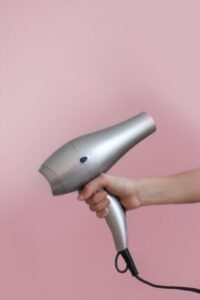Medically reviewed by Dr. Ramesh Gaddam, M.D. — Written by Sumalatha, D.N.H.E
Achieving fast hair growth overnight is a common desire, but it’s essential to set realistic expectations.
While hair typically grows about half an inch per month, certain practices can enhance its health and appearance, making it look longer and fuller more quickly.
This guide will explore effective techniques, including proper hair care, nourishing treatments, and lifestyle adjustments that can contribute to healthier hair growth. Implement these strategies to help your hair reach its full potential!
1. Essential Hair Care Practices
Maintaining healthy hair requires consistent care and attention. Two key aspects of hair care that can impact growth are scalp health and regular trimming.
Scalp Health
The health of your scalp directly influences hair growth. A healthy scalp provides the optimal environment for hair follicles to thrive.
Regular scalp massages can help improve blood circulation, delivering essential nutrients to the hair roots. Use your fingertips to gently massage the scalp in circular motions for a few minutes each day.
Regular Trimming
While it may seem counterintuitive, regular trims are essential for maintaining healthy hair growth. Split ends can travel up the hair shaft, causing further damage and breakage.
Aim to trim your hair every 6-8 weeks to remove split ends and keep your hair looking its best. Regular trims will also help your hair appear fuller and more vibrant.
By prioritizing scalp health and maintaining a regular trimming schedule, you can create a strong foundation for healthy hair growth.
2. Nutritional Support for Hair Growth
A well-balanced diet plays a crucial role in promoting healthy hair growth. The nutrients you consume can significantly impact the strength and vitality of your hair. Here are some key dietary recommendations and hydration tips to support your hair growth journey.
Diet Recommendations
To encourage hair growth, focus on incorporating the following essential nutrients into your meals:
Proteins:
Hair is primarily made of a protein called keratin. Including high-quality protein sources such as fish, lean meats, eggs, beans, and legumes can help strengthen your hair and promote growth.
Vitamins
Certain vitamins are vital for hair health. Vitamin A supports sebum production, which keeps the scalp moisturized. B vitamins, particularly biotin, are known for their role in hair growth.
Foods rich in B vitamins include whole grains, nuts, and leafy greens. Vitamin C aids in collagen production, while Vitamin E helps improve blood circulation to the scalp.
Minerals
Iron and zinc are essential for hair health. Iron helps carry oxygen to hair follicles, while zinc plays a role in tissue growth and repair.
Incorporate foods like spinach, lentils, pumpkin seeds, and oysters into your diet to boost your mineral intake.
Hydration
Staying adequately hydrated is crucial for overall health and can also benefit your hair. Water helps maintain moisture levels in the hair and scalp, preventing dryness and brittleness.
Aim to drink at least eight glasses of water a day, and consider incorporating hydrating foods like cucumbers, watermelon, and oranges into your diet.
By prioritizing a nutrient-rich diet and staying hydrated, you can create the ideal conditions for your hair to grow stronger and healthier.
3. Overnight Treatments
Incorporating overnight treatments into your hair care routine can significantly enhance hair growth and health.
These treatments allow for extended absorption of nourishing ingredients while you sleep, maximizing their benefits. Here are some effective options to consider:
Recommended Oils
Using natural oils can provide deep nourishment to your hair and scalp. Here are a few oils that are particularly beneficial:
Castor Oil:
Rich in ricinoleic acid, castor oil promotes blood circulation to the scalp and has antifungal properties that can help maintain a healthy scalp environment. To use, apply a small amount to your scalp and hair, massaging it in gently. Leave it on overnight and wash it out in the morning.
Coconut Oil:
Known for its moisturizing properties, coconut oil penetrates the hair shaft and reduces protein loss. Apply warm coconut oil to your hair and scalp before bed, covering your hair with a shower cap to prevent staining your pillow. Rinse it out in the morning.
Olive Oil:
Olive oil is rich in antioxidants and can help strengthen hair while providing moisture. Similar to coconut oil, apply it to your hair and scalp overnight and wash it out the next day.
DIY Hair Masks
Creating a nourishing hair mask can also be an effective overnight treatment. Here are two simple recipes:
Avocado and Honey Mask:
Mash one ripe avocado and mix it with two tablespoons of honey. Apply the mixture to your hair, focusing on the ends. Leave it on overnight and rinse it out in the morning for soft, hydrated hair.
Banana and Yogurt Mask:
Blend one ripe banana with half a cup of plain yogurt. This mask provides moisture and essential nutrients. Apply it to your hair and scalp, and leave it on overnight before rinsing.
Application Tips
For the best results, ensure your hair is clean and slightly damp before applying oils or masks.
Use a wide-tooth comb to distribute the product evenly. Protect your pillow with a towel or a shower cap to avoid stains and ensure a mess-free night.
By incorporating these overnight treatments into your routine, you can nourish your hair while you sleep, setting the stage for healthier, faster growth.
4. Lifestyle Adjustments
In addition to hair care routines and dietary changes, certain lifestyle adjustments can significantly influence hair growth.
Managing stress and optimizing your sleep environment are two critical factors that can enhance your hair’s health and vitality.
Stress Management
Stress can have a profound impact on hair growth, potentially leading to hair loss or stunted growth. Implementing stress-reduction techniques can help create a more conducive environment for hair health. Here are some effective strategies:
Mindfulness and Meditation:
Practicing mindfulness or meditation for just a few minutes each day can help calm your mind and reduce stress levels. Consider guided meditation apps or simple breathing exercises to incorporate into your routine.
Regular Exercise:
Physical activity is a natural stress reliever. Aim for at least 30 minutes of moderate exercise most days of the week. Activities like yoga, walking, or dancing can boost your mood and promote overall well-being.
Adequate Sleep:
Quality sleep is essential for recovery and stress management. Aim for 7-9 hours of restful sleep each night. Establish a calming bedtime routine to help signal to your body that it’s time to wind down.
Sleep Environment
Creating a conducive sleep environment can further enhance your hair growth efforts. Here are some tips to optimize your sleep space:
Silk Pillowcases:
Switching to silk or satin pillowcases can reduce friction on your hair while you sleep, minimizing breakage and frizz. These materials help your hair glide smoothly, promoting healthier strands.
Humidity Control:
Maintaining an optimal level of humidity in your bedroom can prevent your hair from becoming too dry. Consider using a humidifier if you live in a dry climate to keep your hair hydrated overnight.
Comfortable Sleeping Position:
Try to avoid sleeping with your hair tied tightly or in styles that can cause tension. Loose braids or simply letting your hair down can help prevent unnecessary stress on the hair follicles.
By managing stress effectively and creating a supportive sleep environment, you can foster conditions that promote healthier hair growth.
These lifestyle adjustments, combined with your hair care routine, can lead to noticeable improvements in your hair’s strength and appearance.
5. Additional Tips
To further enhance your hair growth journey, consider implementing these additional tips that focus on minimizing damage and maximizing hair health. These practices can help you achieve the best results over time.
Avoiding Heat and Chemical Damage
Excessive heat and harsh chemicals can weaken your hair and hinder growth. Here are some strategies to protect your hair from damage:
Limit Heat Styling:
Reduce the use of heat styling tools such as blow dryers, curling irons, and straighteners. When you do use them, apply a heat protectant spray to minimize damage. Opt for air-drying whenever possible.
Choose Gentle Hair Products:
Select shampoos and conditioners that are sulfate-free and designed for your hair type. Avoid products with harsh chemicals that can strip your hair of its natural oils.
Be Cautious with Chemical Treatments:
Hair coloring, perming, and relaxing can weaken hair strands. If you choose to undergo these treatments, ensure you follow up with deep conditioning treatments to restore moisture and strength.
6. Use of Supplements
In some cases, dietary supplements can support hair growth, especially if you have specific deficiencies. Here are some commonly recommended supplements:
Biotin:
Often touted for its hair growth benefits, biotin (Vitamin B7) can help improve the keratin infrastructure of your hair. Consult with a healthcare provider to determine the appropriate dosage for your needs.
Omega-3 Fatty Acids:
These healthy fats can nourish hair follicles and promote hair growth. Consider incorporating omega-3-rich foods like fatty fish, flaxseeds, and walnuts into your diet or taking a supplement.
Multivitamins:
A daily multivitamin can help fill any nutritional gaps in your diet. Look for a multivitamin that includes essential vitamins and minerals for hair health, such as vitamins A, C, D, E, and zinc.
7. Gentle Hair Handling Techniques
How you handle your hair can significantly impact its health. Here are some gentle techniques to adopt:
Use a Wide-Tooth Comb:
After washing your hair, use a wide-tooth comb to detangle it gently, starting from the ends and working your way up to the roots. This helps prevent breakage.
Avoid Tight Hairstyles:
Styles that pull on the hair, such as tight ponytails or braids, can lead to traction alopecia. Opt for looser styles that reduce tension on your hair follicles.
Protective Styles:
Consider wearing protective hairstyles that tuck away the ends of your hair, such as braids or buns. These styles can help prevent damage and allow your hair to grow without interference.
By incorporating these additional tips into your hair care routine, you can create a holistic approach to promoting faster and healthier hair growth. Consistency and patience are key, so give your hair the time and care it deserves to thrive.
Conclusion
Achieving faster hair growth overnight may not be entirely realistic, but with the right combination of practices, you can significantly enhance the health and appearance of your hair over time. By focusing on essential hair care routines, nourishing your body with a balanced diet, and making strategic lifestyle adjustments, you set the stage for optimal hair growth.
Incorporating overnight treatments, managing stress, and adopting gentle handling techniques can further support your hair’s vitality. Remember that patience is crucial; hair growth takes time, and results may vary from person to person.
FAQs on Hair Growth and Related Topics
What are the best oils for promoting hair growth?
Popular oils for hair growth include castor oil, coconut oil, and olive oil. These oils nourish the scalp and hair, promoting healthier growth.
| Best Oils for Hair Growth | Where to Buy? |
| Castor Oil | View on Amazon |
| Coconut Oil | View on Amazon |
| Olive Oil | View on Amazon |
Affiliate Disclaimer:
“As an Amazon Associate, I earn commission if you make any purchase”
How often should I trim my hair for optimal growth?
It’s recommended to trim your hair every 6-8 weeks to remove split ends and maintain hair health, which can help promote growth.
Can diet affect hair growth?
Yes, a balanced diet rich in proteins, vitamins (especially B vitamins), and minerals (like iron and zinc) is crucial for healthy hair growth.
What lifestyle changes can help my hair grow faster?
Managing stress, getting adequate sleep, and maintaining a healthy diet can all contribute to improved hair growth.
Are there supplements that can help with hair growth?
Supplements like biotin and omega-3 fatty acids may support hair health, but it’s best to consult with a healthcare provider before starting any new supplement regimen.
How can I protect my hair from damage?
Limit heat styling, use gentle hair products, and avoid tight hairstyles to minimize damage and breakage, which can hinder growth.
What are some effective overnight hair treatments?
Applying oils or DIY masks overnight can deeply nourish hair. Popular options include castor oil treatments or avocado and honey masks.
Does stress really affect hair growth?
Yes, high stress levels can lead to hair loss or hinder growth, so incorporating stress management techniques is beneficial for hair health.
Also Read:
13 Essential Vitamins: Benefits, Role, List, Dietary Sources
Medically reviewed by Dr. Ramesh Gaddam, M.D.

General Physician, Diabetologist, and Critical Care Specialist.
Discover more from Health Build-Up
Subscribe to get the latest posts sent to your email.




